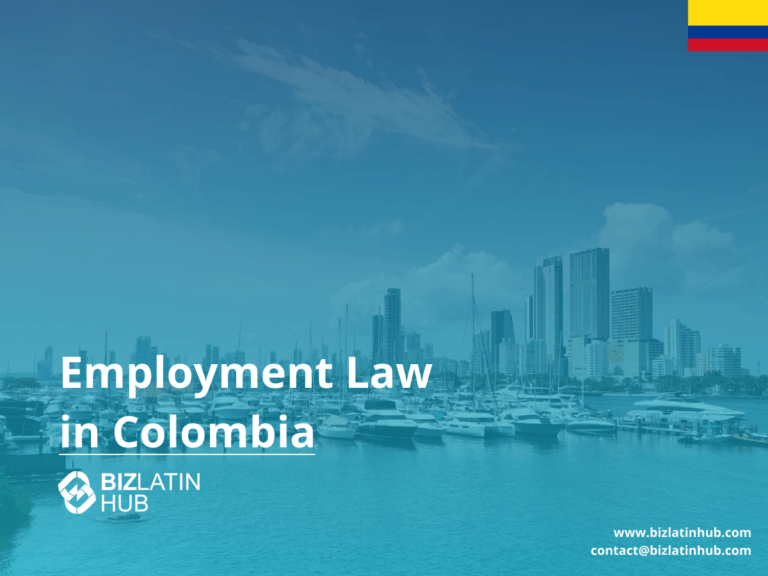Effectively navigating labor laws in Colombia is essential for maintaining your good standing with local authorities and guaranteeing the success of your business. Whether you want to register a company in Colombia or intend to hire employees through a Colombian Employer of Record (EOR), having a overview of local nuances will mitigate preventable pitfalls. Working with local experts allows you to navigate this regulatory framework with confidence and clarity, and at Biz Latin Hub, we provide the knowledge and support you need to hire and administer your team with confidence in Colombia’s entrepreneurial ecosystem.
Key Takeaways
| What are the working hours mandated by labor laws in Colombia? | Colombian labor law sets a maximum work schedule of 8 hours per day and 48 hours per week, not including overtime. |
| What is the Colombian minimum wage? | The current minimum wage as of January 2025 is COP$1,423,500 (aprox USD$330). |
| Types of Employment Contracts in Colombia | Fixed-term. Indefinite-term. Contracts for a set task. Occasional, accidental, or transitory contracts. Provision of services agreements. |
| What percentage of an employee’s salary is contributed to social security in Colombia? | Total contributions is roughly 28.5% of an employee’s salary, with employers covering 20.5% and employees contributing 8%. |
Who Is Protected by Colombian Labor Laws?
Colombian labor laws protect all resident employees, whether they work for local or international companies. Overseen by the Ministry of Labor, the regulations include specific requirements, such as adherence to work visa and reporting obligations through platforms like SIRE and RUTEC. Foreign nationals employed by Colombian-registered companies have the same rights as local employees, with exceptions only applying when a Colombian citizen is hired by an international company under a contract executed outside the country.
Employers must also comply with workforce composition rules, limiting foreign workers to 10% of general staff and 20% of specialized roles in companies with more than 10 employees. Foreign entities hiring in Colombia typically need to establish a local branch or subsidiary to meet payroll and social security obligations, ensuring compliance with labor laws and fair treatment of all employees.
5 Main Types of Employment Contracts in Colombia
There are five main types of contract that are used in Colombia, depending on the nature of the business and job someone is being employed for.
- Fixed-term employment contracts can last for up to three years and extended for as long as needed. If the original contract lasts less than one year, it can be renewed for the same period of time, however any subsequent renewal must be for at least one year.
Under employment law in Colombia, fixed-term contracts include a trial period, which cannot last for more than two months. For contracts of less than one year, the trial period cannot last for more than one fifth of the contract. - Indefinite-term employment contracts run for an unspecified amount of time, either because of the nature of the role being undertaken, or because of an agreement between the employer and employee. Such a contract can only be terminated when both parties agree, or under circumstances established in the contract that allow one party to act unilaterally.
The trial period for an indefinite-term contract cannot last for more than two months and must be specified in the contract. - Contracts for a set task are given for the fulfilment of a specific project. Such a contract must have markers or thresholds written in, or a specified endpoint, to clearly establish when the task will be completed and therefore when the contract ends.
The trial period can be agreed upon by the parties but cannot last for more than two months and must be specified in the contract. - Occasional, accidental, or transitory contracts are used when the work due to be completed falls outside the scope of the company’s standard activities and is generally provided for work that will be completed in less than one month. The intricacies of these contracts need to be fully understood in order to maintain compliance with employment law in Colombia.
- Provision of services agreements, commonly referred to as ‘prestaciones’ contracts, can be established between a company and an individual contractor, and must involve the contractor working with a degree of technical and administrative autonomy.
A prestaciones contract has a civil character and therefore is not considered a labor contract subject to the same provisions under labor and employment law in Colombia. All risks associated with the role being undertaken are therefore assumed by the contractor.
Under such contracts, the employer is not responsible for managing employee deductions, while common benefits such as annual bonuses, paid vacations, and severance pay are also not included.
Note: For all contracts that last at least one year, other than prestaciones contracts, the employee is entitled to a ‘13th salary’ bonus, which totals one full month of salary and is distributed in two parts, one being mid-year and the other in December. A PEO firm in Colombia can help you navigate the Colombia labor laws and maintain compliance for various types of employment contracts.
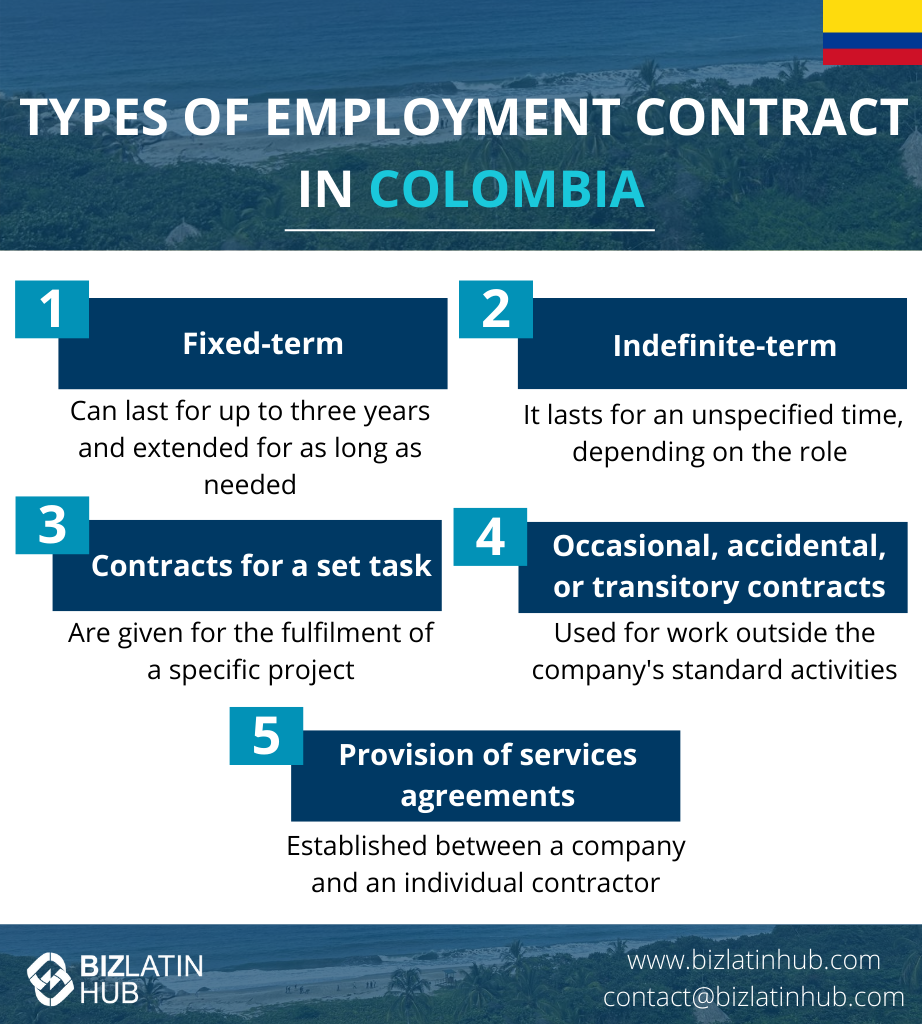
Statutory Contributions Under Colombian Employment Law
Under Colombian employment law, all employees with labor contracts must be enrolled in the integral social security system, which includes the general pension system, health and social security systems, and the general system of professional risks. Contributions are based on the employee’s monthly salary and are capped at 25 times the monthly minimum wage. For 2025, the minimum monthly wage is set at COP$1,423,500, making the maximum contributory salary COP$35,587,500.
Contributions total approximately 28.5% of an employee’s salary, with employers bearing around 20.5% and employees contributing about 8%. These contributions are broken down as follows:
- Pension system contributions: 16% of the employee’s salary (12% employer, 4% employee).
- Health system contributions: 12.5% of the employee’s salary (8.5% employer, 4% employee).
- Professional risk contributions: Vary between 0.522% and 6.96% of the salary depending on job risk level, fully covered by the employer.
Additionally, employees earning more than four times the minimum wage (COP$5,694,000) must contribute an extra 1% to the national pension solidarity fund. Higher earners (those making more than 16 times the minimum wage, or COP 22,776,000) must contribute an additional 0.2% to 1% based on their salary. Employers must also pay a 9% payroll tax for employees earning over 10 times the minimum wage (COP$14,235,000), applied exclusively to salary items.
Employers operating in Colombia must fully understand and comply with these obligations to ensure adherence to local employment laws.
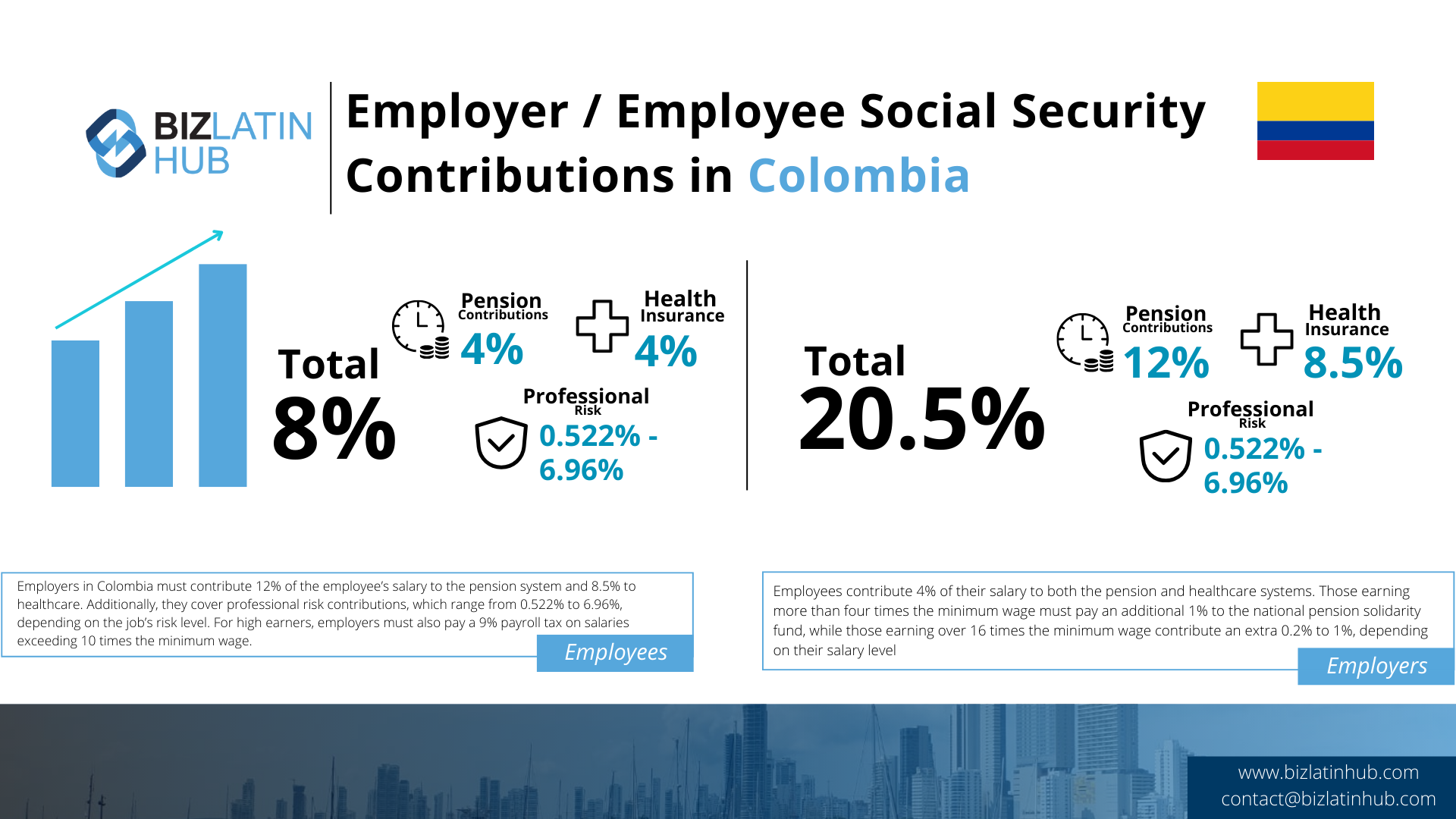
Integral Salaries
An integral salary in Colombia is a comprehensive compensation package that includes base salary and mandatory benefits, such as fringe benefits and overtime payments, but excludes paid vacation allowance and the 13th salary bonus. For 2024, the minimum integral salary is set at COP$18,505,500, which is 13 times the monthly minimum wage of COP 1,423,500.
When calculating pension system contributions for employees with an integral salary, the contribution base is the lesser of 70% of the integral salary or 25 times the minimum monthly wage. This means that for 2024, the maximum contribution base is COP$35,587,500.
Therefore, employees earning an integral salary above approximately COP$46,428,571 per month in 2024 will have their pension contributions capped at the maximum contribution base of COP$35,587,500. Employers and employees should be aware of these thresholds to ensure accurate contributions to the social security system.
Standard Working Hours Under Colombian Employment Law
According to employment law in Colombia, the maximum a person should work is 47 hours per week and will drop to 46 in 2025. Regular working hours consist of eight hours per day, for a maximum of six days per week.
For employees, employers are required to provide the “Día de Familia” and Recreational Days Off. Also, every Sunday is a mandatory rest day in Colombia, so those working six days per week will generally work on a Monday to Saturday schedule, however an employer can negotiate with their employees to elect a different rest day.
Note that in Colombia there are 18 national holidays per calendar year, with February and September being the only months of the year in which at least one national holiday is not observed. In general, those holidays fall on a Monday.
Vacations, Leave, and other Absences Under Colombian Law
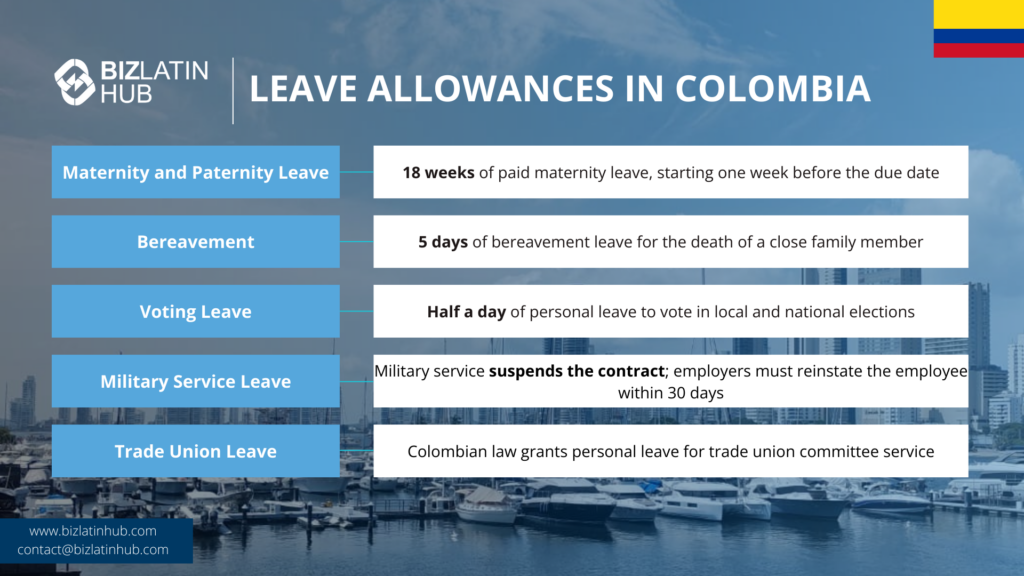
After one full year of service with the same employer, employees are entitled to 15 consecutive working days of paid vacation. Under employment law in Colombia, employees must take at least six of those days, but can only carry over any untaken vacation to the following year. Carrying over vacation must be done with the agreement of the company and can be altered at the discretion of both the employee and employer.
Maternity and Paternity Leave
Female employees are entitled to a total of 18 weeks of paid maternity leave, with the week before the due date being a mandatory leave period, guaranteed by employment law in Colombia. In the case of a premature birth, maternity leave will last for 18 weeks plus the difference between the due date and the day of birth. For example, in the event a baby is born one week early, maternity leave will last for 19 weeks. For multiple births, maternity leave is extended to 20 weeks.
For new fathers, eight days of paid paternity leave are provided, as long as the employee has been contributing to the Social Security System, which will reimburse paternity leave pay to the employer.
Bereavement
Under employment law in Colombia, employees are entitled to five days of bereavement leave in the event of the death of a parent, in-law, grandparent, sibling, child, spouse, or partner. With regards to kinship through adoption, this provision only applies to an adopted parent or child.
The employee’s company assumes all costs related to bereavement leave.
Voting Leave
Under employment law in Colombia, employees are entitled to half a day of personal leave to vote in local and national elections. Upon returning to their place of work, the employee must show their voting card to the employer to demonstrate they voted, and failure to do so will result in the time missed being docked from their salary.
Military Service Leave
In the event that an employee is called up for military service, their employment contract is deemed suspended. Under employment law in Colombia, the employee is obliged to allow the employee to resume the same job within 30 days of that service being completed.
Note that military service in Colombia can last either one or two years, depending on the type of service chosen by the employee.
Trade Union Leave
Colombian labor law dictates that employees are entitled to personal leave in order to serve on a trade union committee. They are also entitled to leave for other trade union purposes, but they must provide adequate notice to the employer, and their absence should not adversely affect the business.
How can an EOR Strategy Keep you Compliant?
For anyone planning a short-term market entry, or who only needs a small number of local employees, and therefore seeks to hire via an employer of record in Colombia, one of the key advantages of the service beyond avoiding the need to form a local entity is the fact that compliance with local employment law will be guaranteed as part of your services agreement. An Employer of Record, also known as a EOR, can help your company remain compliant and up-to-date with reforms and regulations within the company.
Common FAQs about Employment Law in Colombia
In our experience, these are the common questions and doubtful points of our clients.
1. What are the labor laws in Colombia?
In Colombia, labor laws dictate a 46-hour workweek, overtime regulations, minimum wage, paid vacations, sick leave, maternity and paternity leave, workplace safety, and union rights. Termination requires a valid reason, possibly including severance pay.
2. What are the working conditions in Colombia?
Working conditions in Colombia include a 46-hour workweek, one day off per week, paid vacations, social security, and healthcare benefits. Adherence to these regulations may vary across industries.
3. How many hours are in a standard work day in Colombia?
The standard workday in Colombia is 8 hours, with a maximum of 2 hours of overtime, making a workday up to 10 hours long.
4. What is the minimum salary in Colombia?
As of January 2025, the minimum wage in Colombia is COP1,423,000, approximately USD$330/month.
5. How is overtime paid in Colombia?
Overtime is paid at 125% of the regular wage. Night overtime (9:00 p.m. to 6:00 a.m.) and work on Sundays and public holidays are paid at 175%. Overtime is capped at 2 hours per day, or 12 hours a week.
6. What are the laws regarding employment termination in Colombia?
Employment termination can be for just cause or without cause. Just cause includes misconduct, negligence, or consistent and documented underperformance. Termination without cause requires severance pay based on years of service and salary. Notice periods or indemnity may apply.
7. What are the requirements for terminating an employee in Colombia?
In Colombia, the employer has the discretion to unilaterally terminate an employee’s employment, either with or without cause.
- Written Notice: The employer must provide the employee with a written notice of termination.
- Severance Pay: Colombian law mandates the payment of severance pay, which includes compensation for unused vacation time, bonuses, and other benefits. The specific calculations may vary based on the length of service and the type of contract.
- Notice Period: Depending on the contract, there may be specific notice periods that must be adhered to.
Termination With Cause: - Fair Causes: The employer must identify and invoke one or more fair causes for dismissal, as defined by Colombian law.
- Communication: These causes must be communicated to the employee, detailing the reasons for termination. The employee must be allowed to justify and defend themselves.
- Notice Period: Generally, a 2-week notice is required for termination due to low performance or other specific causes.
- Severance Pay: Unlike termination without cause, termination with cause does not require the payment of severance pay. However, all accrued labor benefits must still be paid to the employee.
In both scenarios, adherence to legal procedures and proper documentation are essential to ensuring compliance with Colombian labor laws. Consulting with a legal expert or labor attorney is often advisable to navigate the complexities of employment termination in Colombia.
8. What happens when an employee quits in Colombia?
An employee can quit without a notice period. The employer must pay outstanding wages, accrued vacation, and other legally required benefits.
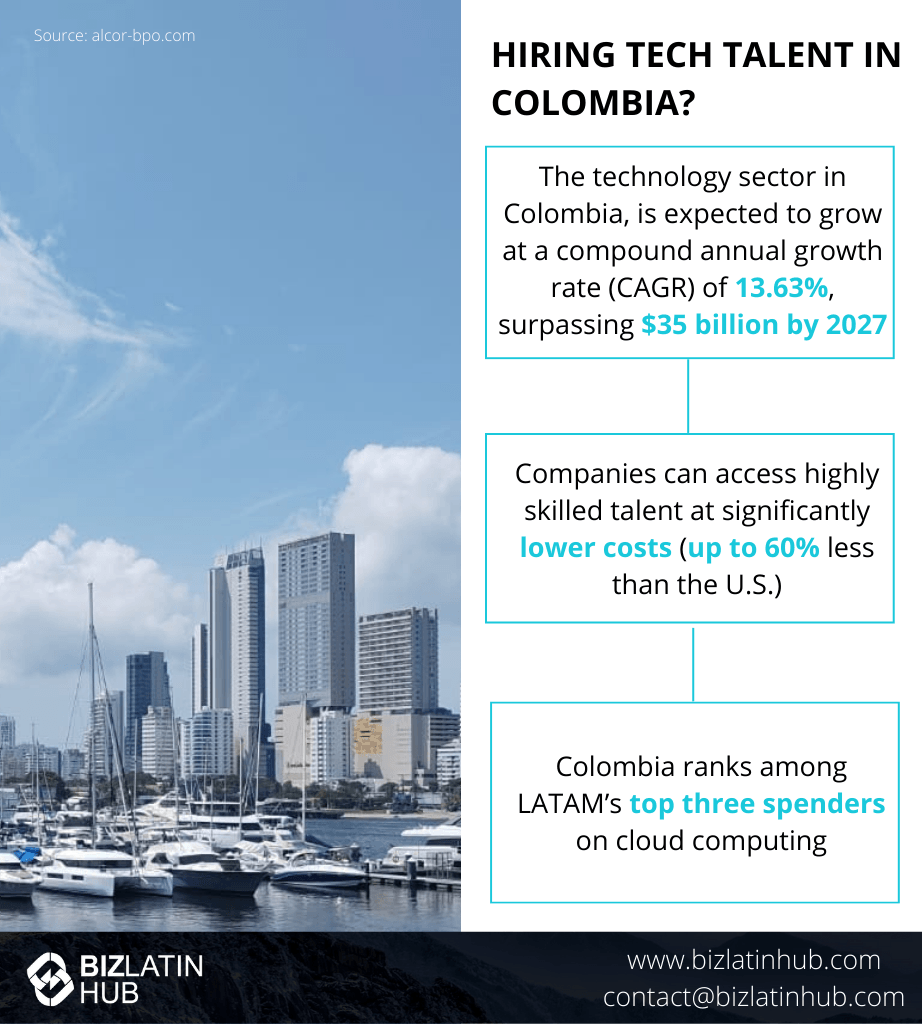
Why Choose to Hire Employees in Colombia?
Hiring local employees in Colombia offers international investors a strategic advantage due to the country’s skilled and cost-competitive workforce. Colombia boasts a growing pool of professionals with expertise in sectors like technology, finance, and manufacturing, supported by strong university programs and vocational training. Employing local talent also enables businesses to navigate the cultural and linguistic nuances of the Colombian market, fostering stronger connections with clients and partners while improving operational efficiency.
Additionally, hiring locally ensures compliance with Colombian labor laws, mitigating legal risks and enhancing a company’s reputation as a responsible employer. By contributing to the local economy through job creation and tax payments, international investors can also benefit from incentives such as tax breaks and government-backed workforce development programs. These factors make Colombia an attractive destination for businesses seeking growth in Latin America.
At Biz Latin Hub, our multilingual team of corporate support specialists has the knowledge and expertise to support you in doing business in Colombia. Our comprehensive portfolio of services, including company formation, accounting, tax advisory, and hiring & PEO, means we can provide tailored packages of integrated back-office solutions and be your single point of contact for doing business in Colombia, or any of the other 17 markets around Latin America and the Caribbean where we have local teams in place.
Contact us now to discuss how we can support your business.
Or learn more about our team and expert authors.
